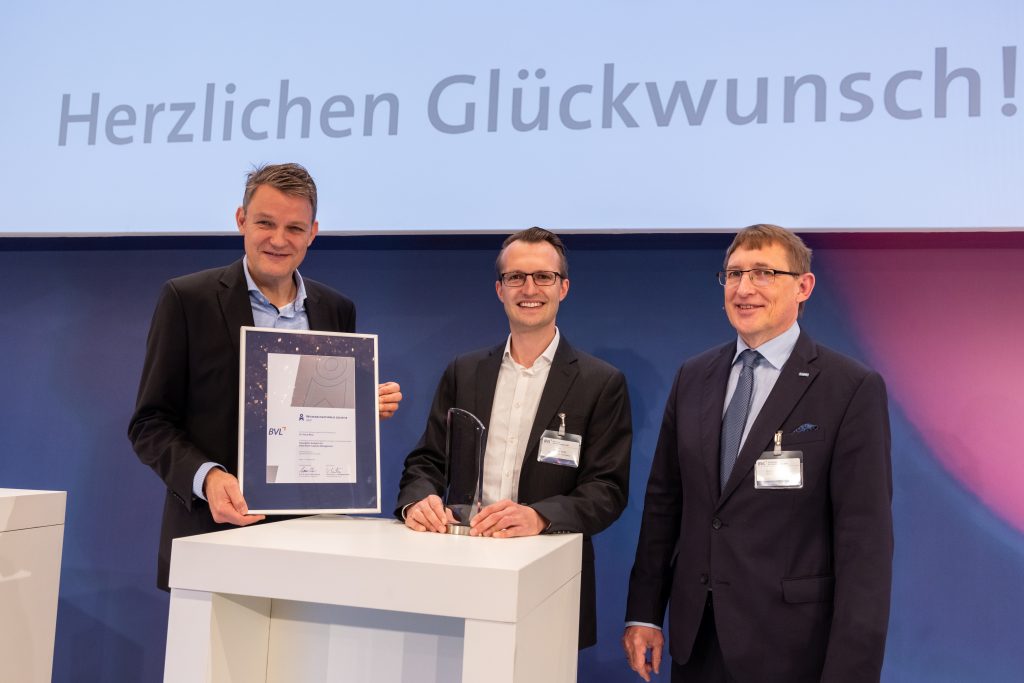
Photos: Award ceremony on 22.10. at the German Logistics Congress. f.l.: Knut Alicke, Partner, McKinsey & Company, award winner Dr. Pascal Notz, Jury Chairman Prof. Dr. Wolfgang Kersten, Institute for Logistics and Corporate Management at TU Hamburg / Photos © BVL/Bublitz
Berlin/Bremen. The Logistics Science Award 2021 was presented for the 30th time this morning at the German Logistics Congress in Berlin.
This year, the coveted award goes to Dr Pascal Notz for his dissertation “Prescriptive Analyses for Data-Driven Capacity Management” at the Chair of Logistics and Quantitative Methods in Business Administration at the University of Würzburg.
In his description, the award winner explains that he has developed novel methods that combine machine learning approaches with classical optimisation to make better capacity management decisions in logistics with the help of large data sets. The data sets already available to companies today (historical observations of demand as well as explanatory variables) offer previously untapped opportunities to plan better through innovative, prescriptive methods and thus reduce costs.
The newly developed methods in the context of his dissertation were applied to practical planning problems in cooperation with the project partners Main-Post Logistik and Lufthansa Technik Logistik Services and evaluated on real, historical data.
Compared to classical approaches, the prescriptive methods led to performance improvements of up to 58%, which shows the potential of these novel methods. This makes it possible, for example, to directly determine the optimal order quantity or employee capacity.
The jury was impressed by the high scientific level, the highly topical subject, the novel combination of methods as well as the high practical relevance with broad application possibilities.
The laudation
Prof. Dr. Wolfgang Kersten from the Institute for Logistics and Corporate Management at the Technical University of Hamburg said in his laudation: “Through its innovation and application orientation, the Science Award challenges the winner to break completely new ground without losing sight of the possibility of practical application. This is exactly what our award winner has done in an outstanding way with his work. The correct planning of personnel, machine and transport capacities plays a decisive role in logistics – because it is not only about cost efficiency, but also about customer satisfaction with the logistics service provided. This gives rise to complex planning problems under uncertainty, where usually not even a probability distribution is known. To find a solution, Dr. Notz turns to the still young research field of “predictive analytics” and uses it for data-supported capacity planning. In essence, a mathematical function is learned on the basis of the available historical data, which is then used to generate a proposed solution for the capacity plan. For this purpose, he does not use existing procedures, but develops two completely new machine learning procedures in his work. He then applies the developed procedures to concrete planning problems of two renowned practice partners. In the process, he is able to prove that improvements of more than 50 % are possible in some cases compared to traditional planning methods. The procedure developed allows for extensive automation of capacity planning, which can also be transferred to other applications. In order to gain the acceptance of the planners, Dr. Notz pursues the idea of so-called “Explainable AI”, i.e. explainable artificial intelligence. He has designed his procedure in such a way that the planners receive precise information about why the procedure has suggested certain capacities. In this way, the planners can ultimately adjust the result in a targeted manner based on their expert knowledge. The fact that Dr. Pascal Notz was able to publish his research results in Management Science – probably the most respected scientific journal in the field of business administration worldwide – shows that his ideas are already attracting international scientific attention.”
The other finalists
After a pre-selection by the jury, the best applicants are asked to compete in the final with a presentation of their work – in 2021 this took place as a digital pre-event to the German Logistics Congress. In addition to the prize winner, there were two other finalists. “Dynamic Control Strategies for Internal Route Train Systems” was the topic of Dr.-Ing. Christian Lieb, supervised by Prof. Dr.-Ing. Johannes Fottner, Chair of Materials Handling Material Flow Logistics at TU Munich.
The second finalist was Jan Phillip Müller, supervised by Prof. Dr. Ralf Elbert, Department of Logistics at the TU Darmstadt. He applied with the paper “Stochastic design of service networks for intermodal freight transport”.
This year’s Logistics Science Award is endowed with 5,000 euros for the scientist and is supported by McKinsey & Company, Inc.
